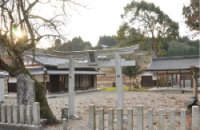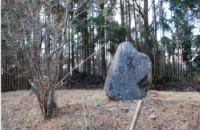Episode 3:
Two Choices:The Fates of Two Brothers
From the Kojiki, Volume II
“Eastern Expedition of Emperor Jimmu”
Kamu-yamato-iware-biko no Mikoto (later Emperor Jimmu) and his party left Himuka, and went to Uda on their way to Yamato.
Two brothers lived in this region: Eukashi, the elder brother,and Otōkashi,the younger brother. Kamu-yamato-iware-biko no Mikoto’s party sent them a messenger crow, or the yāta-garasu which was leading their party, to find out whether or not the two brouthers would obey him.
The elder brother was waiting for the messenger bird and drove it away by firing a sounding arrow, or narikabura, at it. He then went to gather his soldiers, but was not very successful. Next, he built a large palace equipped with traps, and then lied to Kamu-yamato-iware-biko no Mikoto by saying “I’ll serve you.” The elder brother had a scheme to lure the party into his trapped palace.
His younger brother, on the other hand, ran to the party and revealed his brother’s plot.
Immediately Michino'omi no Mikoto and Ōkume no Mikoto, who served Kamu-yamato-iware-biko no Mikoto, summoned the elder brother, and threatened him with their swords and bows, saying “You should enter the palace first as proof of your obedience.”
The elder brother was driven into the palace. He fell into the trap he himself had set, and was crushed to death. It is said that his corpse was then pulled out and torn apart. According to the Kojiki, the ground dyed with his blood was called Chihara (bloody field).
The younger brother, on the other hand, treated the party to a feast as a token of his obedience.
In this story, the younger brother seems to have betrayed the elder brother, but these brothers may have taken opposing actions for the survival of their clan. Whichever fate they chose, both brothers may have had deep affections for their clan.
Related tourism sites:
Uga Shrine, Utano, Uda City
The surrounding area is now called Ugashi. It is thought that this area used to be called Uda-no-Ukachi, as written in the Kojiki.
This shrine is believed to house Eukashi and Otōkashi as the principle deities.

Takagi Castle Ruins in Uda, Utano, Uda City
It is said that the ruins of Takagi Castle in Uda are some of the oldest in Japan, and are thought to be where Kamu-yamato-iware-biko no Mikoto (Emperor Jimmu) built his castle when he marched toward Uda.
